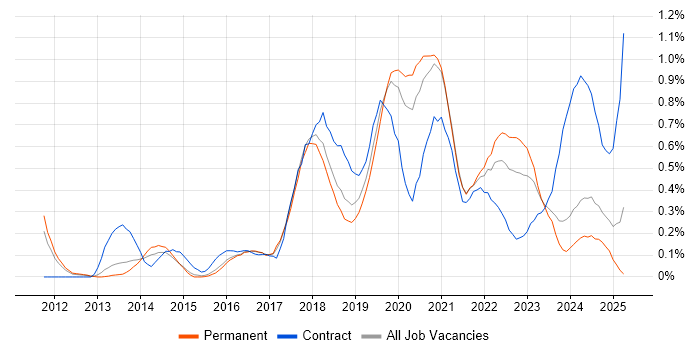The table below provides summary statistics for permanent job vacancies advertised in Birmingham requiring knowledge or experience of Splunk products and/or services. It includes a benchmarking guide to the annual salaries offered in vacancies that cited Splunk over the 6 months leading up to 4 February 2026, comparing them to the same period in the previous two years.
The figures below represent the IT labour market in general and are not representative of salaries within Splunk, Inc.
|
|
6 months to
4 Feb 2026 |
Same period 2025 |
Same period 2024 |
| Rank |
107 |
117 |
120 |
| Rank change year-on-year |
+10 |
+3 |
+19 |
| Permanent jobs citing Splunk |
1 |
2 |
3 |
| As % of all permanent jobs in Birmingham |
0.053% |
0.11% |
0.16% |
| As % of the Vendors category |
0.17% |
0.25% |
0.36% |
| Number of salaries quoted |
1 |
2 |
3 |
| 10th Percentile |
- |
£64,500 |
- |
| 25th Percentile |
£81,625 |
£67,500 |
- |
| Median annual salary (50th Percentile) |
£83,250 |
£75,000 |
£50,000 |
| Median % change year-on-year |
+11.00% |
+50.00% |
-23.08% |
| 75th Percentile |
£84,875 |
£82,500 |
- |
| 90th Percentile |
- |
£85,500 |
- |
| West Midlands median annual salary |
£83,250 |
£75,000 |
£50,000 |
| % change year-on-year |
+11.00% |
+50.00% |
-23.08% |
Splunk falls under the Vendor Products and Services category. For comparison with the information above, the following table provides summary statistics for all permanent job vacancies requiring knowledge or experience of all vendor products and services in Birmingham.
| Permanent vacancies with a requirement for knowledge or experience of vendor products and services |
599 |
789 |
833 |
| As % of all permanent jobs advertised in Birmingham |
31.86% |
44.86% |
43.16% |
| Number of salaries quoted |
371 |
378 |
700 |
| 10th Percentile |
£31,250 |
£37,500 |
£26,680 |
| 25th Percentile |
£43,497 |
£46,250 |
£36,250 |
| Median annual salary (50th Percentile) |
£60,000 |
£58,000 |
£55,000 |
| Median % change year-on-year |
+3.45% |
+5.45% |
- |
| 75th Percentile |
£70,000 |
£70,000 |
£67,313 |
| 90th Percentile |
£81,250 |
£83,750 |
£78,875 |
| West Midlands median annual salary |
£53,000 |
£52,500 |
£47,500 |
| % change year-on-year |
+0.95% |
+10.53% |
-5.00% |


